| Srl | Item |
| 1 |
ID:
094441


|
|
|
|
|
| Publication |
2010.
|
| Summary/Abstract |
Racism and xenophobia have fueled radical right-wing party electoral success across Western Europe. This article investigates whether key changes have occurred in radical right-wing xenophobia in recent years, mainly a moderating trend and a shifting out-group focus. The analysis in this article suggests such a 21st-century transformation. Radical right-wing party programmatic orientations have moderated and their appeals have broadened. The out-groups and immigrant enemies of the postwar era have been superseded, especially as anti-Semitism has been traded for anti-Muslim Islamophobia. Populism is explored in its potential causal logic for observed changes.
|
|
|
|
|
|
|
|
|
|
|
|
|
|
|
|
| 2 |
ID:
094430
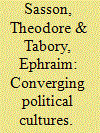

|
|
|
|
|
| Publication |
2010.
|
| Summary/Abstract |
We examine the impact of globalization on Israeli and American Jews' attitudes regarding religious pluralism and minority civil rights in Israel. Studying middle-class Israeli and American Jews of European descent, we find overlap across (and differentiation within) the groups. We attribute political cultural convergence to globalization: (1) international travel; (2) diffusion of Jewish transnational institutions; (3) increased integration of Israel into global capitalist relations; and (4) perceived security threats moving American Jews toward increased security concerns for themselves and Israel. We perceive new patterns of transnational engagement in which Israeli and American Jews seek common cause with their like-minded counterparts.
|
|
|
|
|
|
|
|
|
|
|
|
|
|
|
|
| 3 |
ID:
094434


|
|
|
|
|
| Publication |
2010.
|
| Summary/Abstract |
Existing studies assess attitudes about Americanness within the context of racial and ethnic group differences. However, this paper examines the relative effects of racial, ethnic, and religious group memberships across a variety of national sentiments, including patriotism and ethnoculturalism. Results from the 1996 and 2004 General Social Surveys (N = 1851) indicate that subgroup affiliations strongly influence beliefs about the salience and substance of American national identity. The implications for the complexity of the findings are discussed, as well as suggestions for future research.
|
|
|
|
|
|
|
|
|
|
|
|
|
|
|
|
| 4 |
ID:
094177
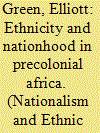

|
|
|
| 5 |
ID:
094428
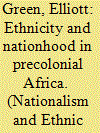

|
|
|
|
|
| Publication |
2010.
|
| Summary/Abstract |
While recent historical scholarship has attempted to read back the existence of nations into medieval Europe, a similar revisionism has yet to take place amongst scholars of Africa. Here I take up the case of Buganda, a precolonial kingdom on the northern edge of Lake Victoria in what is now central Uganda. I show that Buganda in the mid-19th century fits various definitions of both ethnic groups and nations, while its neighbors largely do not. Thus the Bugandan case both demonstrates further evidence for the existence of premodern nations and illuminates the great variety of precolonial identities present in Africa.
|
|
|
|
|
|
|
|
|
|
|
|
|
|
|
|
| 6 |
ID:
094432
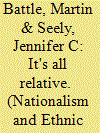

|
|
|
|
|
| Publication |
2010.
|
| Summary/Abstract |
Benin has held several rounds of free and fair presidential and parliamentary elections since 1991, but little is known about how the individual citizens of Benin cast their votes and why. We created a model to test what factors-social, economical, and political-impact individual support for certain candidates, using the Afrobarometer survey. We explored contextual factors, such as concentration of ethnic group in respondent's area, by marrying census data to the Afrobarometer's individual-level data. We found that different candidates appeal to voters for different reasons, and that ethnicity alone is usually not enough to explain support for a candidate. Moreover, we found that when ethnicity is a factor, having a concentration of the ethnic group in your region can enhance the effect of ethnicity on political preferences.
|
|
|
|
|
|
|
|
|
|
|
|
|
|
|
|
| 7 |
ID:
094437
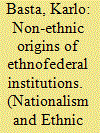

|
|
|
|
|
| Publication |
2010.
|
| Summary/Abstract |
Many scholars argue that the territorial accommodation of nationalist demands usually results from "ethnic" factors, such as the threat of ethnonationalism to the integrity of the state. Using the case of the former Yugoslavia, this article shows that explanations of ethnofederal outcomes must also consider non-ethnic political factors. In the Yugoslav case, the anti-statist ideology of the central leadership provided the autonomy-seeking actors with the discursive means to neutralize their centralist opponents and, in the process, to turn the state into a confederation.
|
|
|
|
|
|
|
|
|
|
|
|
|
|
|
|